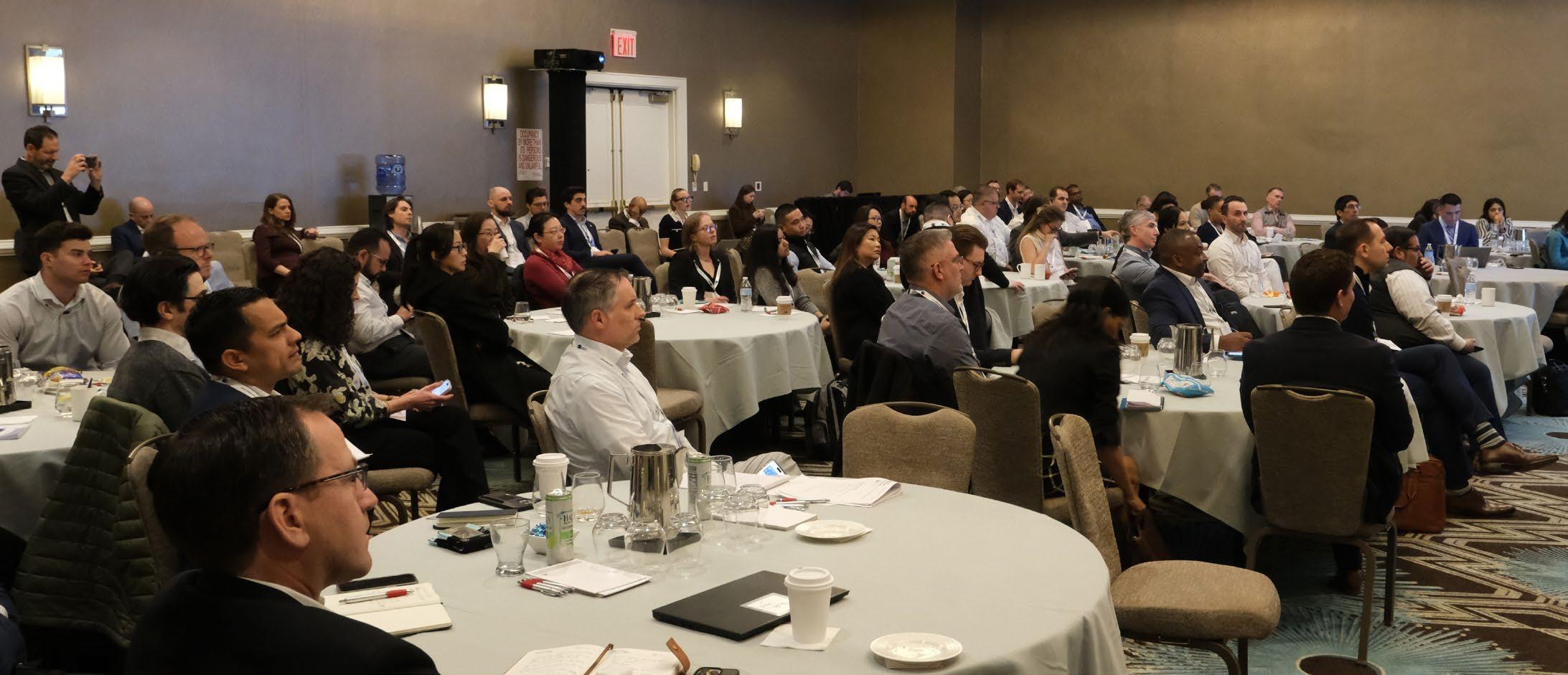Financial Crime Europe: AML & Sanctions Edition
Building AML & Sanctions Strategies that Combat Financial Crime and Protect Your Organization September 23-24, 2025
London

20+
20+ 150+ Sessions Speakers Attendees
Key themes 2025:
Strategy
Recalibrating Risk Intelligence: Financial Crime in a Shifting Global Risk Landscape
Emerging Technologies
Harnessing AI for AML: Technology-Driven Strategies to Combat Digital Financial Crime
Risk-Based Approach
Adaptive AML Compliance: A Risk-Based Strategy for Unique Challenges
SAR (Suspicious Activity Reporting)
Decoding the Key to Effective SAR Models
Collaboration & Communication
Partnerships in Practice: How Internal and External Alliances can Strengthen AML Strategy
Who’s Participating:





Saurav Banerjee
Global Head of Risk Intelligence and Digital Asset Compliance UBS
Adrianna Fabijanska
Global Head Financial Crime Compliance – Investment Banking ING Wholesale Banking
Allan Reid
Group MLRO & Head of Anti-Financial Crime
Baillie Gifford & Co
Pallavi Kapale
Senior Financial Crime Officer - Financial Intelligence Unit (FIU), Financial Crime and Compliance Department Bank of China (UK) Limited
Arjun Ahluwalia
Global Head of Sanctions and Geopolitical Risk, Financial Crime Compliance Santander Corporate and Investment Banking
Agenda | Day 1 | September 23, 2025
8:00 REGISTRATION & BREAKFAST
8:50 CHAIR’S OPENING REMARKS
STRATEGY
9:00 Recalibrating Risk Intelligence: Financial Crime in a Shifting Global Risk Landscape
• Understanding how geopolitical instability, economic uncertainty, and rapid regulatory shifts are reshaping financial crime exposure across institutions
• Why forward-looking, intelligence-led risk frameworks are essential for identifying and mitigating emerging financial crime threats
• Managing cross-border compliance complexity amid tightening sanctions regimes, evolving AML directives, and rising enforcement action
• How institutions can better integrate financial crime into overall risk appetite, governance, and capital planning in today’s highrisk climate
Saurav Banerjee, Global Head of Risk Intelligence and Digital Asset Compliance, UBS
TECH & INNOVATION
9:30 The Future of Compliance: Adapting AntiMoney Laundering Strategies in the Age of Technological Innovation
• Analyzing how financial technology innovations are reshaping the AML landscape and necessitating a re-evaluation of compliance frameworks
• Identifying new money laundering risks stemming from digital platforms and their implications for AML strategies
• Exploring the role of advanced data analytics and machine learning in improving transaction monitoring and enhancing the detection of suspicious activities
• Diversifying the approach to adapting to innovations: the need for tailored solutions that align with specific operational goals
Adrianna Fabijanska, Global Head Financial Crime Compliance – Investment Banking, ING Wholesale Banking
EMERGING TECHNOLOGIES - PANEL DISCUSSION
10:00 Harnessing AI for AML: Technology-Driven Strategies to Combat Digital Financial Crime
• Navigating the complexities of transaction anonymity and regulatory oversight within Decentralized Finance (DeFi) platforms, leveraging AI for enhanced monitoring
• Overcoming challenges in detecting and regulating suspicious activities within cryptocurrency exchanges through AI-powered transaction analysis
• Addressing the potential pitfalls of AI-driven AML analytics, including bias, transparency concerns, and the necessity for robust human oversight in decision-making
• Strengthening digital identity verification in diverse markets using AI-driven authentication solutions to mitigate money laundering risks posed by inadequate verification processes
Pedro Cervera Ruiz, Director of Operations, Outsourcing, Procurement and Fraud, Ibercaja
Colin Whitmore, Innovation and Design, Financial Crime & Controls, Natwest
10:50 MORNING REFRESHMENT BREAK & NETWORKING
DATA
11:20 Mind the Data Gap: Why Quality Matters in Your AML Strategy
• Data quality and how it is affecting AML strategies and other financial crime areas in financial services
• Identifying prevalent issues such as data silos, inconsistencies in customer information, and lack of standardisation across systems that hinder effective AML compliance
• Instituting robust data governance frameworks that include data ownership, quality controls, and regular auditing to improve data integrity – best practices
Allan Reid, Group MLRO & Head of Anti-Financial Crime, Baillie Gifford & Co
AI - PANEL DISCUSSION
11:50 Optimizing AI-Powered AML: Strengthening Data Quality for Enhanced Fraud Detection
• Addressing implications of poor data quality on AI performance and likely solutions
• Exploring practical mechanisms for integrating real-time data verification methods to enhance data reliability and compliance efficiency
• Facilitating collaboration between financial institutions and tech providers to continually assess and improve data quality, ensuring AI models are trained on accurate datasets
• The importance of implementing robust remediation programs and choosing the right data governance systems to safeguard organisational AML initiatives
Ionela Emmett, Senior Manager, Financial Crime Controls, Risks & Policy and Advisory, ICBC Standard Bank
Mario Menz, Deputy Chair of Executive Committee, The Institute of Money Laundering Prevention Officers
Rajitha M Prabhakaran, Group Financial Crime Officer, Domestic & General Insurance Plc
12:40 LUNCH AND ROUNDTABLE DISCUSSIONS
LUNCHTIME NETWORKING ROUNDTABLES
Utilizing machine learning to detect anomalous transaction patterns and integrate AI-driven insights into AML frameworks
Ionela Emmett, Senior Manager, Financial Crime Controls, Risks & Policy and Advisory, ICBC Standard Bank
Marina Antoniou, Global Markets Head of Market Abuse Risk Assessment, Natwest Markets
Enhancing data accuracy and reliability in KYC processes to strengthen customer due diligence
Zafer Ergezen, Practice Lead/Director - KYC, Client Due Diligence, Fraud, Transactional Due Diligence, Onboarding, GarantiBank International NV
Allan Reid, Group MLRO & Head of Anti-Financial Crime, Baillie Gifford & Co
Minimizing human error in Suspicious Activity Reports (SARs) through automation and improved compliance protocols
Pallavi Kapale, Senior Financial Crime Officer - Financial Intelligence Unit (FIU), Financial Crime and Compliance Department, Bank of China (UK) Limited
Implementing a risk-based approach in AML using advanced scoring models and risk profiling techniques
Tauane Sousa-Jajo, Head of Financial Crime Monitoring and Assurance, Financial Crime Risk (FCR), BACB
Saurav Banerjee, Global Head of Risk Intelligence, UBS
RISK-BASED APPROACH - PANEL DISCUSSION
2:00 Adaptive AML Compliance: A Risk-Based Strategy for Unique Challenges
• Tailoring risk assessment frameworks to the specific context of financial institutions, ensuring a targeted approach to AML compliance
• Aligning compliance strategies with identified high-risk areas, including customer segments, regions, and transaction types
• Setting proactive and responsive AML frameworks to continuously monitor and reassess risk profiles in light of emerging threats and regulatory changes
Tauane Sousa-Jajo, Head of Financial Crime Monitoring and Assurance, Financial Crime Risk (FCR), BACB
DUE DILIGENCE
2:30 Know Your Customer, Know You’re Compliant: Due Diligence Best Practice
• Establishing a robust risk assessment model ensuring focused compliance efforts
• Implementing best practices for accurately identifying beneficial owners through advanced verification techniques and crossreferencing
• Developing a clear framework for understanding the purpose and nature of customer relationships, including transaction patterns and expected behaviours
• Examples of using automated KYC platforms and machine learning to increase due diligence efforts
Zafer Ergezen, Practice Lead/Director - KYC, Client Due Diligence, Fraud, Transactional Due Diligence, Onboarding, GarantiBank International NV
SAR (Suspicious Activity Reporting)
3:00 Decoding the Key to Effective SAR (Suspicious Activity Reporting) Models
• Ongoing difficulties in collecting and analysing relevant data to identify suspicious activities effectively
• Examining the impact of the latest regulatory updates on SAR protocols and the need to adapt quickly to evolving expectations from regulators
• How to balance the need to maintain efficient operations and commercial interests with adhering to SAR requirements
• Importance of training of employees involved in SAR processes to enhance their understanding of regulatory requirements, improve detection capabilities, and foster a proactive culture around reporting
Pallavi Kapale, Senior Financial Crime Officer - Financial Intelligence Unit (FIU), Financial Crime and Compliance Department, Bank of China (UK) Limited
3:30 AFTERNOON BREAK & NETWORKING
TRANSACTION MONITORING
4:00 Who’s On Watch? Strengthening Compliance Through Automated Transaction Monitoring
• Latest regulatory standards and expectations for transaction monitoring that organizations must adhere to in their automated systems
• Case studies of effectively implemented automated transaction monitoring systems and the impact on compliance and operational efficiency
• Identifying common obstacles such as integration with existing systems, data quality issues, and resource constraints, and discussing possible solutions
• AI and big data analytics, and their potential to enhance transaction monitoring capabilities, enabling real time anomaly detection and enhanced risk mitigation
Mario Menz, Deputy Chair of Executive Committee, The Institute of Money Laundering Prevention Officers
COLLABORATION AND COMMUNICATION - PANEL DISCUSSION
4:30 : Partnerships in Practice: How Internal and External Alliances can Strengthen AML Strategy
• How to establish successful cross-departmental collaboration (between compliance, legal, and risk management teams) to improve information sharing and more effective AML responses
• Fostering open communication and partnerships with regulators to help navigate compliance challenges and clarify reporting expectations
• Collaboration with law enforcement in AML efforts, such as joint task forces or information-sharing initiatives
• Information sharing between financial services institutions – how to achieve the most efficiency?
Pallavi Kapale, Senior Financial Crime Officer - Financial Intelligence Unit (FIU), Financial Crime and Compliance Department, Bank of China (UK) Limited
Neil Giles, President, Stop the Traffik
Glen Dawson, Head of Audit, Financial Crime, Natwest
David Cox, Head, Financial Crime & Compliance Advisory, Lloyd’s of London
5:20 NETWORKING DRINKS RECEPTION
6:20 END OF DAY 1

Agenda | Day 2 | September 24, 2025
8:00 REGISTRATION & BREAKFAST
8:50 CHAIR’S OPENING REMARKS
KEYNOTE PRESENTATION
9:00
Nathalie von Taaffe, Managing Director, Global Head of Sanctions, Anti-Corruption, Anti-Tax Evasion, Financial Crime, Barclays
KEYNOTE PRESENTATION
9:30 Sanctions Enforcement in the UK: Lessons from Practice and Priorities for the Future
• OFSI priorities
• OFSI Impact and Headline Stats
• Current focus:
• Recent enforcement action and lessons for industry
• Publications (e.g. Finanical Sector Threat Assessment, crypto assessment may also be of interest to attendees)
• Future Direction
• Cross Government Review of Sanctions Enforcement and Implementation – Enforcement Consultation
Luke Jewell, Sanctions Enforcement Branch Head, OFSI, HM Treasury
REGULATORY COMPARISON
10:00 Spot the Difference – The Transatlantic Differences in Regulation & Compliance
• Recent trends in regulatory scrutiny on sanctions compliance across financial institutions in Europe
• Comparative analysis of regulatory obligations: How the EU’s compliance requirements differ from those in the US and other jurisdictions
• Strategies for multinational corporations to adapt compliance systems in response to diverse regulatory landscapes
Neil Whiley, Head of Sanctions, Bank ABC
10:30 MORNING REFRESHMENT BREAK & NETWORKING

GEOPOLITICAL RISKS PANEL DISCUSSION
11:00 The Political Dynamic – Navigating Geopolitical Risk in Business and Finance
• Implications of changes in international relations on sanctions policies and practices
• Preparedness for rapid shifts in geopolitical contexts and their potential effects on existing sanctions regimes
• The intersection of international conflict and economic sanctions: examining risks and opportunities for financial institutions
• How geopolitical developments influence key financial instruments, including instant payments, cross border transactions and broader financial processes
Arjun Ahluwalia, Global Head of Sanctions and Geopolitical Risk, Financial Crime Compliance, Santander Corporate and Investment Banking
Allan Reid, Group MLRO & Head of Anti-Financial Crime, Baillie Gifford & Co
Gulli Zaripova, Vice President Financial Crimes and Sanctions Compliance, Sumitomo Mitsui Banking Corporation
Neil Whiley, Head of Sanctions, Bank ABC
GOVERNANCE AND OVERSIGHT
11:40 Building Strong Governance and Oversight Frameworks for Sanctions Compliance
• Defining roles and responsibilities within organizations for sanctions compliance to ensure effective governance and support comprehensive oversight
• Implementing robust data management protocols and regular audits in streamlining AML and sanctions teams’ activities
• Providing ongoing training to staff on evolving sanctions regulations and compliance obligations to mitigate risks improve governance
• Fostering seamless communication and collaboration between compliance, legal, risk management, and operational teams to promote a unified approach to sanctions oversight and address potential vulnerabilities
Oliver Chapman, UK Head of Embargoes and Sanctions, SOCIETE GENERALE SA
12:10 LUNCH AND ROUNDTABLE DISCUSSIONS
BRIBERY AND CORRUPTION
1:10 The role of bribery and corruption in facilitating financial crime in the UK
• The corruption threat and the UK’s evolving counter corruption landscape
• How bribery and corruption intersect with fraud, financial crime and organised crime networks
• Corruption as an insider threat; signs and system vulnerabilities
Gareth Dothie, Head of Bribery and Corruption Investigations, City of London Police
OPERATIONAL CHALLENGES - PANEL DISCUSSION
1:40 The Race is On – Overcoming Operational Hurdles in the management of sanctions issues
• Strategies for managing the increasing complexity of sanctions oversight while meeting escalating regulatory expectations
• Navigating the need to balance operational efficiency with stringent compliance requirements to avoid penalties and enforcement actions
• Dealing with the operational difficulties of handling inconsistent sanctions lists (national, international, and internal) while ensuring alignment with regulatory standards
• Trade sanctions prohibitions/circumvention and the operational hurdles this brings for institutions
• Mitigating reputational risk and stakeholder expectations in light of compliance failures or sanctions violations, and managing heightened scrutiny from stakeholders, including regulators and customers in response to compliance failures or sanctions violations
Shereen George, Head of Sanctions, BNP Paribas
Oliver Chapman, UK Head of Embargoes and Sanctions, SOCIETE GENERALE SA
SANCTION EVASION - PANEL DISCUSSION
2:15 Sanctions Evasion Tactics: Legal Structures and Emerging Threats
• The use of shell companies and layered ownership structures to obscure financial flows and evade regulatory oversight
• The exploitation of virtual assets and cryptocurrencies as alternative channels for sanctions circumvention and money laundering
• Trade-based money laundering schemes. Including falsified invoicing and deceptive supply-chain arrangements, to bypass sanctions enforcement
Stella Grossu, Head of Risk Management, Montold Asset Management
Gareth Dothie, Head of Bribery and Corruption Investigations, City of London Police
2:50 AFTERNOON BREAK & NETWORKING
COOPERATION BETWEEN FINANCIAL CRIME STREAMS - PANEL DISCUSSION
3:20 Making the Dream Work – Why Teamwork Between All Financial Crime Streams (AML, CTF, Sanctions, ABC, Fraud etc) Matters
• How gaps faced by financial crime streams due to a lack of communication and collaboration can lead to inefficiencies in compliance efforts
• Developing strategies for aligning AML and sanctions compliance frameworks, highlighting the importance of a cohesive approach to managing financial crime risks across departments
• Best practices in for improving cross-team information sharing to enhance detection capabilities and strengthen responses to suspicious activities
• Training initiatives and collaboration programs that foster a culture of cooperation ensuring financial crime teams work together seamlessly
Erik Morgan, Group Financial Crime Prevention - Lead Global Customer Risk Model Team, SEB
Svetlana Zarubina-Thomas, Head of Financial Crime Compliance, Daiwa Capital Markets Europe Ltd
RISK APPETITE - PANEL DISCUSSION
4:05 The High Stakes Game of Risk - Understanding Risk Appetite in High-Risk Scenarios
• Evaluating organizations’ risk appetite in relation to high-risk jurisdictions and sectors to inform strategic decision-making and compliance efforts
• Evaluating vulnerabilities associated with financial products, trade finance and digital assets to ensure alignment with risk management frameworks
• Tailoring compliance strategies to organizational structures – whether banks, fintech, asset managers or multinational corporations – to optimize risk mitigations and regulatory alignment
• Examples and insights of risks management related to high-risk jurisdictions, effective practices and strategies
Saurav Banerjee, Global Head of Risk Intelligence, UBS
4:35 CHAIR’S CLOSING REMARKS
4:45 END OF CONFERENCE

Why should you be attending these sessions?


Recalibrating Risk Intelligence Amid a Shifting Global Landscape

This keynote frames the entire conference, highlighting how geopolitical instability, economic volatility, and regulatory changes reshape financial crime risk. It’s pivotal for both AML and sanctions professionals as it stresses the importance of intelligence-led, forward-looking frameworks and cross-border compliance integration.
AI and Data in AML: Harnessing Technology for Detection and Monitoring
With AI becoming core to AML innovation, these sessions focus on:
• AI-powered transaction monitoring
• Challenges in digital identity verification and DeFi oversight

• The crucial role of data quality in model accuracy and compliance
How machine learning is reshaping SAR submissions and due diligence

Operationalizing a RiskBased AML Approach
The shift from rule-based to risk-based AML compliance is a foundational trend. This session emphasizes: Tailoring frameworks to unique institutional risk profiles
Ongoing risk assessment in response to dynamic threat landscapes
• It is critical for institutions aiming to optimize compliance resources and manage growing regulatory expectations efficiently
Navigating Sanctions Compliance in a Fragmented Geopolitical and Regulatory Environment
With sanctions regimes tightening, this trio of sessions covers:
• The differences in EU vs US sanctions laws
• The influence of geopolitics on compliance
• Building internal governance structures to sustain oversight
Sanctions Evasion and Emerging Threat Vectors
• How shell companies, crypto assets, and tradebased schemes are used to circumvent sanctions
• Detection challenges posed by layered ownership and digital anonymity
• As sanctions evasion becomes more sophisticated, understanding these threats is vital to designing effective controls.


Strengthening Transaction Monitoring with Automation and Advanced Analytics
• Automated systems to meet evolving regulatory expectations
• Integration challenges and the role of AI in anomaly detection
• Real-time monitoring and big data analytics to enhance efficiency

Sanctions Compliance, List Management and Horizon Scanning
Focused on operationalizing sanctions compliance through:
• Refined list screening algorithms to reduce false positives
• Centralized data systems for onboarding and monitoring
• Using horizon scanning to anticipate regulatory and geopolitical shifts
Cross-Stream Integration: Unifying AML, Sanctions, Fraud, and ABC
• Eliminating siloed operations between financial
crime
streams
• Shared intelligence and training to boost detection and response
• Unified risk management and compliance across all crime types
• This holistic approach is increasingly prioritized as institutions seek efficiency and stronger control across all financial crime domains.




































